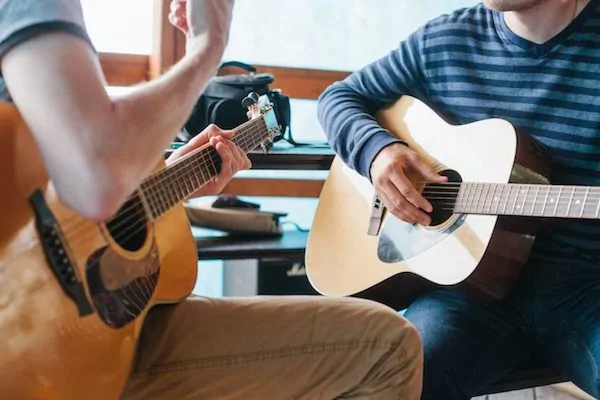5 Reasons to Finally Take Music Lessons This Year

Have you dreamed about gathering your family around the piano to sing the holiday favorites you can play beautifully? Maybe your child plays air guitar in the living room or bangs an imaginary drum?
Music provides much more than entertainment, although the value in that alone is immeasurable. Music lessons pay off in real academic, social, and physical ways too. Here are the top five reasons you should put music lessons at the top of your to-do list.
1. Music Lessons Make You Smarter
Did you know Albert Einstein was a master violinist? He started lessons when he was 6, and scientists theorize those early classes helped him learn to use both sides of his brain at the same time. That may help to explain his genius.
Other scientific studies have shown that children who take music lessons when they’re young experience significant improvement in brain development. One reason may be the connection between music and math. Music students learn scales and rhythms. They may not realize it, but they’re also learning division and fractions.
Need more convincing? Another study found music majors in college attained the highest reading scores among all majors including English.
2. Music Helps Disadvantaged Children Succeed in School
Evidence shows music lessons may be able to do what traditional academic classes have not, namely, help the kids who come from lower socio-economic homes. Learning to play an instrument improves both their reading and math abilities.
It also improves the way some children process distractions like loud noises or conversations. Music lessons appear to help children learn to focus and tune out the noise. That in turn can help them better focus on the material being taught in the classroom.
3. Music Classes Help Babies Develop Social Skills
Wondering if your little one is too little for music? The research is pretty clear that even babies can benefit from exposure to music.
One study found music actually helped babies learn communication skills earlier than babies who had no exposure. Babies who joined interactive music classes smiled and waved sooner and more often than little ones who did not participate in similar classes.
4. Musical Training May Help Slow the Aging Process
It’s never too early or too late to take music lessons. Older adults who studied music as children demonstrated a faster brain response than adults who never took lessons.
What’s especially interesting about this study is that it found the benefits of music lessons lasted, even in adults who hadn’t played an instrument in decades.
5. Music Lessons Help With Physical Development
Learning to play an instrument requires a certain amount of physical dexterity. The drums, for example, often require the drummer to keep two, distinct rhythms at the same time. Violinists learn to do completely different things with their hands simultaneously.
Musicians must learn how to hold their instruments and how to sit or stand relative to them. They also learn to hold those positions for extended periods of time which improves both physical conditioning and discipline.
The Connection Between Music and Executive Functioning
By “executive functioning”, we’re not talking about corporate executives. The term refers to our ability to perform certain high-level tasks. Music lessons appear to help students process information, regulate behavior, and solve complex problems.
Please check out our blog to learn more ways to keep students engaged.

